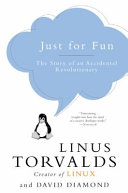

In 'Just for Fun,' Linus Torvalds and David Diamond explore the intersection of technology, innovation, and playfulness. The authors argue that creativity and innovation thrive in environments where play is encouraged, c...
Continue readingOne of the core themes of 'Just for Fun' is the necessity of play in the realm of innovation and technology. The authors, Linus Torvalds and David Diamond, argue that the act of playing – whether through coding, experime...
Continue reading'Just for Fun' delves into the significance of open-source culture in the tech industry. The authors highlight how open-source projects encourage collaboration among developers from diverse backgrounds, fostering a sense...
Continue readingA recurring theme in 'Just for Fun' is the importance of passion in technology development. The authors argue that true innovation stems from individuals who are deeply passionate about their work. They share stories of ...
Continue reading'Just for Fun' emphasizes the importance of embracing failure as an essential component of the innovation process. The authors recount various instances where initial failures led to valuable lessons and, ultimately, suc...
Continue reading'Just for Fun' also addresses the broader implications of technology on society. The authors discuss how advancements in technology can reshape industries, economies, and even cultures. They explore the ethical considera...
Continue readingThe authors highlight the significance of community in technology development throughout 'Just for Fun.' They argue that a supportive community can provide invaluable resources, feedback, and encouragement for developers...
Continue reading'Just for Fun' explores the relationship between technology and art, arguing that the two fields are not mutually exclusive but rather complementary. The authors discuss how creative expression can enhance technological ...
Continue readingThe reading time for Just for Fun depends on the reader's pace. However, this concise book summary covers the 7 key ideas from Just for Fun, allowing you to quickly understand the main concepts, insights, and practical applications in around 22 min.
Just for Fun is definitely worth reading. The book covers essential topics including The Importance of Play in Innovation, Open Source Culture and Collaboration, The Role of Passion in Technology, providing practical insights and actionable advice. Whether you read the full book or our concise summary, Just for Fun delivers valuable knowledge that can help you improve your understanding and apply these concepts in your personal or professional life.
Just for Fun was written by David Diamond, Linus Torvalds.
If you enjoyed Just for Fun by David Diamond, Linus Torvalds and want to explore similar topics or deepen your understanding, we highly recommend these related book summaries:
These books cover related themes, complementary concepts, and will help you build upon the knowledge gained from Just for Fun. Each of these summaries provides concise insights that can further enhance your understanding and practical application of the ideas presented in Just for Fun.